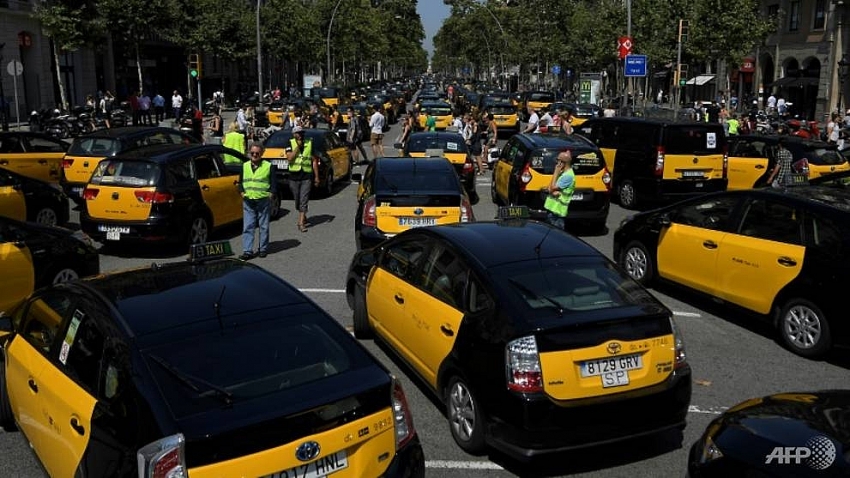Madrid taxis join Barcelona strike against Uber
 |
| Taxi drivers blocked the Gran Via in Barcelona on July 27, 2018 during a strike. Taxi drivers in Madrid joined the action on July 28 protesting at "unfair competition" from Uber and Cabify. (Photo: AFP/Lluis Gene) |
The federation of Madrid taxis claimed all 15,000 drivers in the capital had joined the movement and that it would spread to other cities.
"All taxis have spontaneously and progressively stopped work, paralysing services in the capital, at the airport, around bus and railway stations", federation secretary Santiago Simon Vicente told AFP.
"The main problem is the proliferation of VTC licences," he said.
"There are more and more of them, thousands, and it's unfair competition."
The federation called on the authorities to enforce legislation under which there should be 30 traditional taxis for every VTC (Tourism Vehicle with Chauffeur).
Today there are only five for every VTC, said Vicente.
Taxi drivers cut access to central Barcelona on Friday after the Spanish government appealed a ruling approved by Barcelona authorities that limited the number of licences for Uber-style services.
"Today everything is blocked in Barcelona, the airport, the stations, etc," the head of Taxis Companys, Luis Lopez, told AFP.
"We will not move, all night, all day tomorrow ... (until) there is a solution," he warned.
Violence erupted in Barcelona where the strike began on Wednesday. Drivers threw stones at the vehicles of Uber-style licensed private chauffeurs, with some ending up with flat tyres.
The attacks prompted Uber and Cabify to suspend their services in Barcelona for as long as the taxi strike lasts.
Unauto, which represents Uber and Cabify, on Saturday urged the Spanish government to "take back control of the streets saying "violent" taxi drivers were trying to defend a monopoly.
The authorities called "for calm" on Saturday and for representatives from each side to meet next week to find a solution.
What the stars mean:
★ Poor ★ ★ Promising ★★★ Good ★★★★ Very good ★★★★★ Exceptional
 Tag:
Tag:
Related Contents
Latest News
More News
- State corporations poised to drive 2026 growth (February 03, 2026 | 13:58)
- Why high-tech talent will define Vietnam’s growth (February 02, 2026 | 10:47)
- FMCG resilience amid varying storms (February 02, 2026 | 10:00)
- Customs reforms strengthen business confidence, support trade growth (February 01, 2026 | 08:20)
- Vietnam and US to launch sixth trade negotiation round (January 30, 2026 | 15:19)
- Digital publishing emerges as key growth driver in Vietnam (January 30, 2026 | 10:59)
- EVN signs key contract for Tri An hydropower expansion (January 30, 2026 | 10:57)
- Vietnam to lead trade growth in ASEAN (January 29, 2026 | 15:08)
- Carlsberg Vietnam delivers Lunar New Year support in central region (January 28, 2026 | 17:19)
- TikTok penalised $35,000 in Vietnam for consumer protection violations (January 28, 2026 | 17:15)






















 Mobile Version
Mobile Version